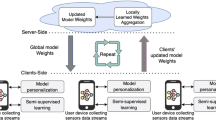Abstract
One of the most significant applications in pervasive computing for modeling user behavior is Human Activity Recognition (HAR). Such applications necessitate us to characterize insights from multiple resource-constrained user devices using machine learning techniques for effective personalized activity monitoring. On-device Federated Learning proves to be an extremely viable option for distributed and collaborative machine learning in such scenarios, and is an active area of research. However, there are a variety of challenges in addressing statistical (non-IID data) and model heterogeneities across users. In addition, in this paper, we explore a new challenge of interest – to handle heterogeneities in labels (activities) across users during federated learning. To this end, we propose a framework with two different versions for federated label-based aggregation, which leverage overlapping information gain across activities – one using Model Distillation Update, and the other using Weighted \(\alpha \)-update. Empirical evaluation on the Heterogeneity Human Activity Recognition (HHAR) dataset (with four activities for effective elucidation of results) indicates an average deterministic accuracy increase of at least \(\sim \)11.01% with the model distillation update strategy and \(\sim \)9.16% with the weighted \(\alpha \)-update strategy. We demonstrate the on-device capabilities of our proposed framework by using Raspberry Pi 2, a single-board computing platform.
Access this chapter
Tax calculation will be finalised at checkout
Purchases are for personal use only
Similar content being viewed by others
References
Bonawitz, K., et al.: Towards federated learning at scale: system design. In: SysML 2019 (2019)
Chang, Y., Mathur, A., Isopoussu, A., Song, J., Kawsar, F.: A systematic study of unsupervised domain adaptation for robust human-activity recognition. Proc. ACM Interactive Mob. Wearable Ubiquitous Technol. 4(1), 1–30 (2020)
Deng, Y., Kamani, M.M., Mahdavi, M.: Adaptive personalized federated learning. arXiv preprint arXiv:2003.13461 (2020)
Feng, S., Duarte, M.F.: Few-shot learning-based human activity recognition. Expert Syst. Appl. 138, 112782 (2019)
Gudur, G.K., Balaji, B.S., Perepu, S.K.: Resource-constrained federated learning with heterogeneous labels and models. arXiv preprint arXiv:2011.03206 (2020)
Gudur, G.K., Sundaramoorthy, P., Umaashankar, V.: ActiveHARNet: towards on-device deep Bayesian active learning for human activity recognition. In: The 3rd International Workshop on Deep Learning for Mobile Systems and Applications, pp. 7–12 (2019)
Hammerla, N.Y., Halloran, S., Plötz, T.: Deep, convolutional, and recurrent models for human activity recognition using wearables. In: Proceedings of the Twenty-Fifth International Joint Conference on Artificial Intelligence, IJCAI 2016, pp. 1533–1540. AAAI Press (2016)
Hinton, G., Vinyals, O., Dean, J.: Distilling the knowledge in a neural network. In: NIPS Deep Learning and Representation Learning Workshop (2015)
Kairouz, P., et al.: Advances and open problems in federated learning. arXiv preprint arXiv:1912.04977 (2019)
Kingma, D.P., Ba, J.: Adam: A method for stochastic optimization. arXiv preprint arXiv:1412.6980 (2014)
Konečnỳ, J., McMahan, H.B., Ramage, D., Richtárik, P.: Federated optimization: Distributed machine learning for on-device intelligence. arXiv preprint arXiv:1610.02527 (2016)
Lane, N.D., Bhattacharya, S., Georgiev, P., Forlivesi, C., Kawsar, F.: An early resource characterization of deep learning on wearables, smartphones and internet-of-things devices. In: Proceedings of the 2015 International Workshop on Internet of Things Towards Applications, pp. 7–12. IoT-App 2015 (2015)
Li, D., Wang, J.: FedMD: heterogenous federated learning via model distillation. arXiv preprint arXiv:1910.03581 (2019)
Li, T., Sahu, A.K., Talwalkar, A., Smith, V.: Federated learning: challenges, methods, and future directions. IEEE Sig. Process. Mag. 37, 50–60 (2020)
Li, T., Sahu, A.K., Zaheer, M., Sanjabi, M., Talwalkar, A., Smith, V.: Federated optimization in heterogeneous networks. Proc. Mach. Learn. Syst. 2020, 429–450 (2020)
Lim, W.Y.B., et al.: Federated learning in mobile edge networks: a comprehensive survey. IEEE Commun. Surv. Tutorials (2020)
McMahan, H.B., Moore, E., Ramage, D., Hampson, S., Arcas, B.A.Y.: Communication-efficient learning of deep networks from decentralized data. In: Proceedings of the 20th International Conference on Artificial Intelligence and Statistics, vol. 54, pp. 1273–1282 (2017)
Osmani, V., Balasubramaniam, S., Botvich, D.: Human activity recognition in pervasive health-care: supporting efficient remote collaboration. J. Netw. Comput. Appl. 31, 628–655 (2008)
Ramakrishnan, A.K., Naqvi, N.Z., Preuveneers, D., Berbers, Y.: Federated mobile activity recognition using a smart service adapter for cloud offloading. In: Park, J., Jin, Q., Sang-soo Yeo, M., Hu, B. (eds.) Human Centric Technology and Service in Smart Space, pp. 173–180. Springer, Heidelberg (2012). https://doi.org/10.1007/978-94-007-5086-9_23
Sozinov, K., Vlassov, V., Girdzijauskas, S.: Human activity recognition using federated learning. In: 2018 IEEE International Conference on Parallel & Distributed Processing with Applications, Ubiquitous Computing & Communications, Big Data & Cloud Computing, Social Computing & Networking, Sustainable Computing & Communications (ISPA/IUCC/BDCloud/SocialCom/SustainCom), pp. 1103–1111. IEEE (2018)
Stisen, A., et al.: Smart devices are different: assessing and mitigating mobile sensing heterogeneities for activity recognition. In: Proceedings of the 13th ACM Conference on Embedded Networked Sensor Systems, SenSys 2015, pp. 127–140 (2015)
Sundaramoorthy, P., Gudur, G.K., Moorthy, M.R., Bhandari, R.N., Vijayaraghavan, V.: HARNet: towards on-device incremental learning using deep ensembles on constrained devices. In: Proceedings of the 2nd International Workshop on Embedded and Mobile Deep Learning, pp. 31–36. EMDL 2018 (2018)
Yao, S., Hu, S., Zhao, Y., Zhang, A., Abdelzaher, T.: Deepsense: a unified deep learning framework for time-series mobile sensing data processing. In: Proceedings of the 26th International Conference on World Wide Web, WWW 2017, pp. 351–360 (2017)
Yao, S., Zhao, Y., Shao, H., Zhang, C., Zhang, A., Hu, S., Liu, D., Liu, S., Su, L., Abdelzaher, T.: SenseGAN: enabling deep learning for internet of things with a semi-supervised framework. Proc. ACM Interactive Mob. Wearable Ubiquitous Technol. 2(3), 1–21 (2018)
Zhao, Y., Li, M., Lai, L., Suda, N., Civin, D., Chandra, V.: Federated learning with non-iid data. arXiv preprint arXiv:1806.00582 (2018)
Author information
Authors and Affiliations
Corresponding author
Editor information
Editors and Affiliations
Rights and permissions
Copyright information
© 2021 Springer Nature Singapore Pte Ltd.
About this paper
Cite this paper
Gudur, G.K., Perepu, S.K. (2021). Resource-Constrained Federated Learning with Heterogeneous Labels and Models for Human Activity Recognition. In: Li, X., Wu, M., Chen, Z., Zhang, L. (eds) Deep Learning for Human Activity Recognition. DL-HAR 2021. Communications in Computer and Information Science, vol 1370. Springer, Singapore. https://doi.org/10.1007/978-981-16-0575-8_5
Download citation
DOI: https://doi.org/10.1007/978-981-16-0575-8_5
Published:
Publisher Name: Springer, Singapore
Print ISBN: 978-981-16-0574-1
Online ISBN: 978-981-16-0575-8
eBook Packages: Computer ScienceComputer Science (R0)




